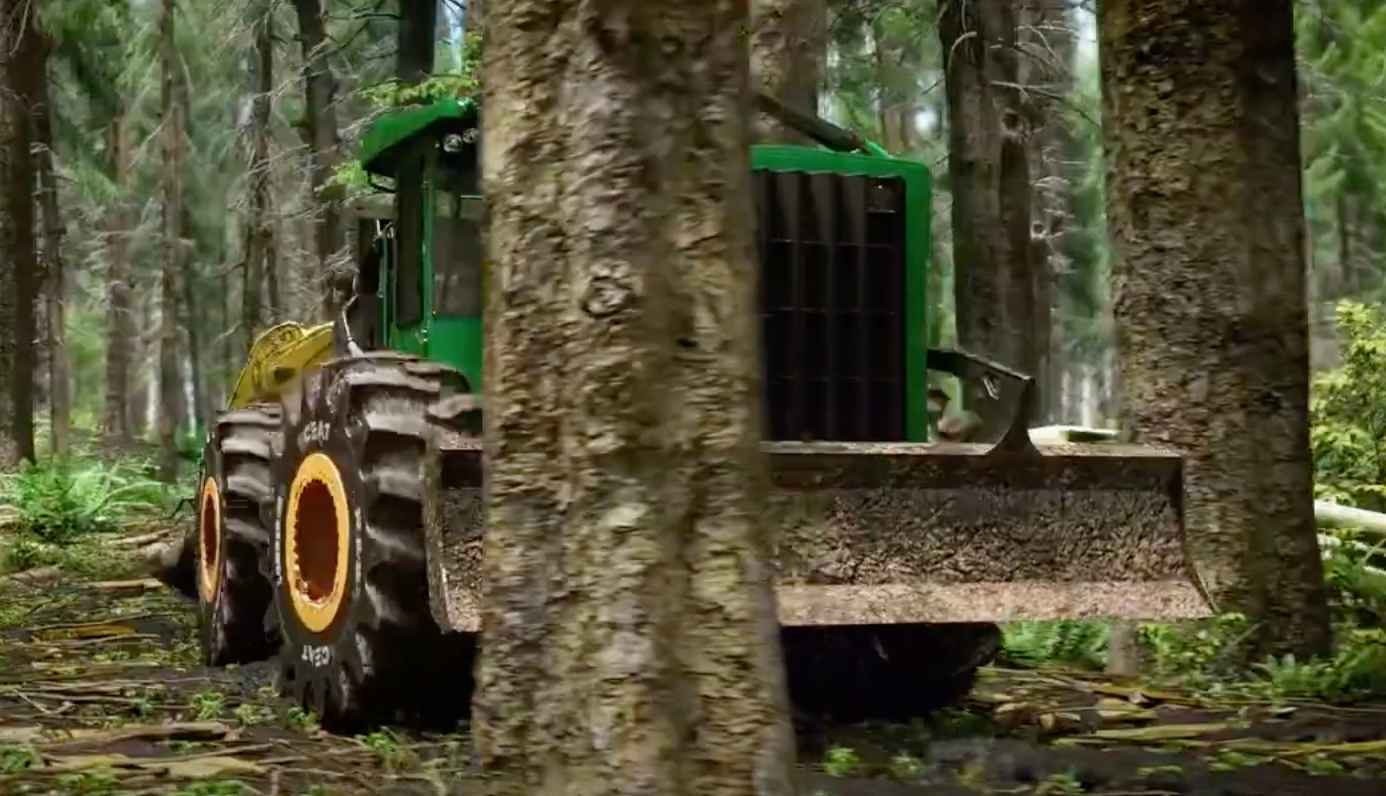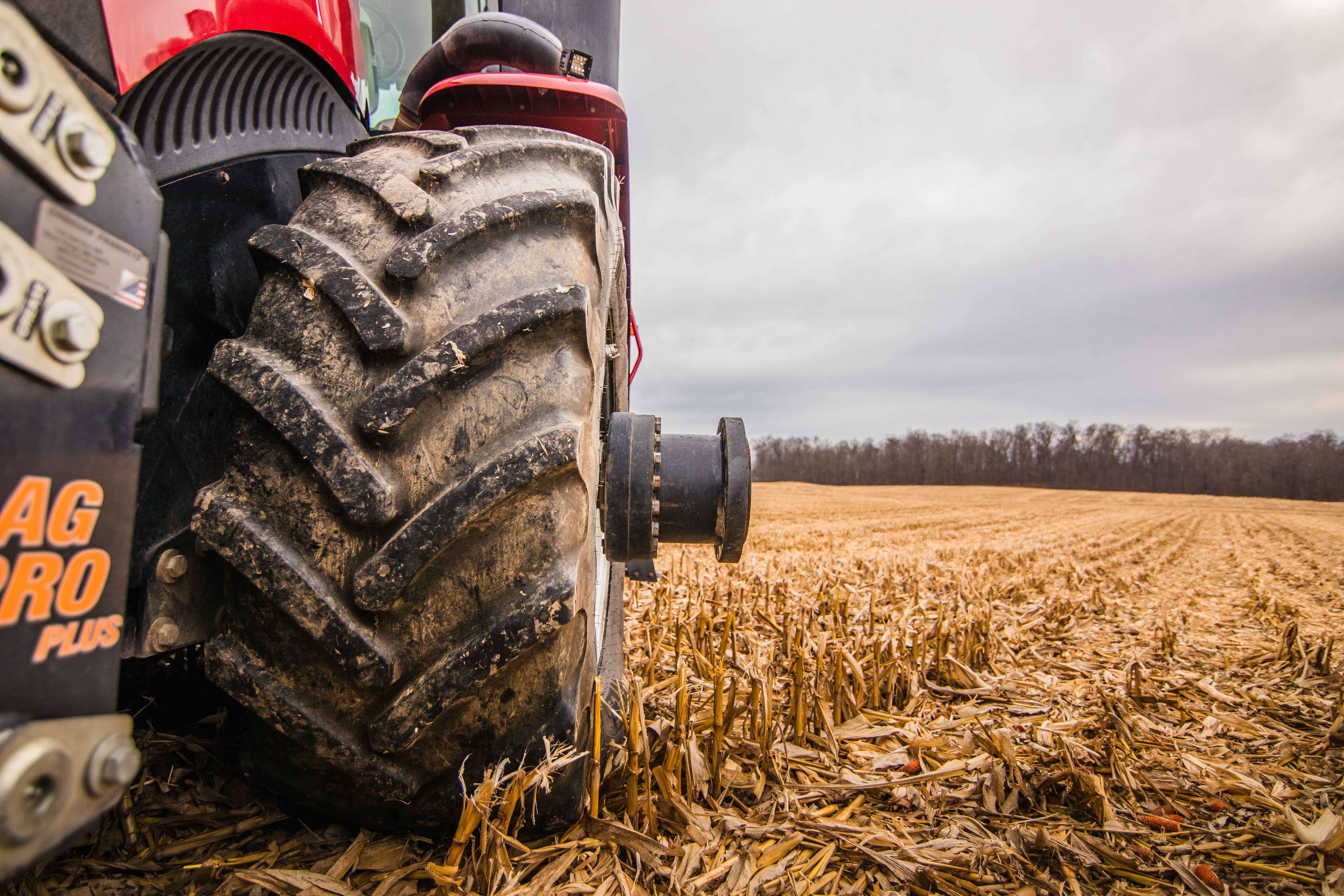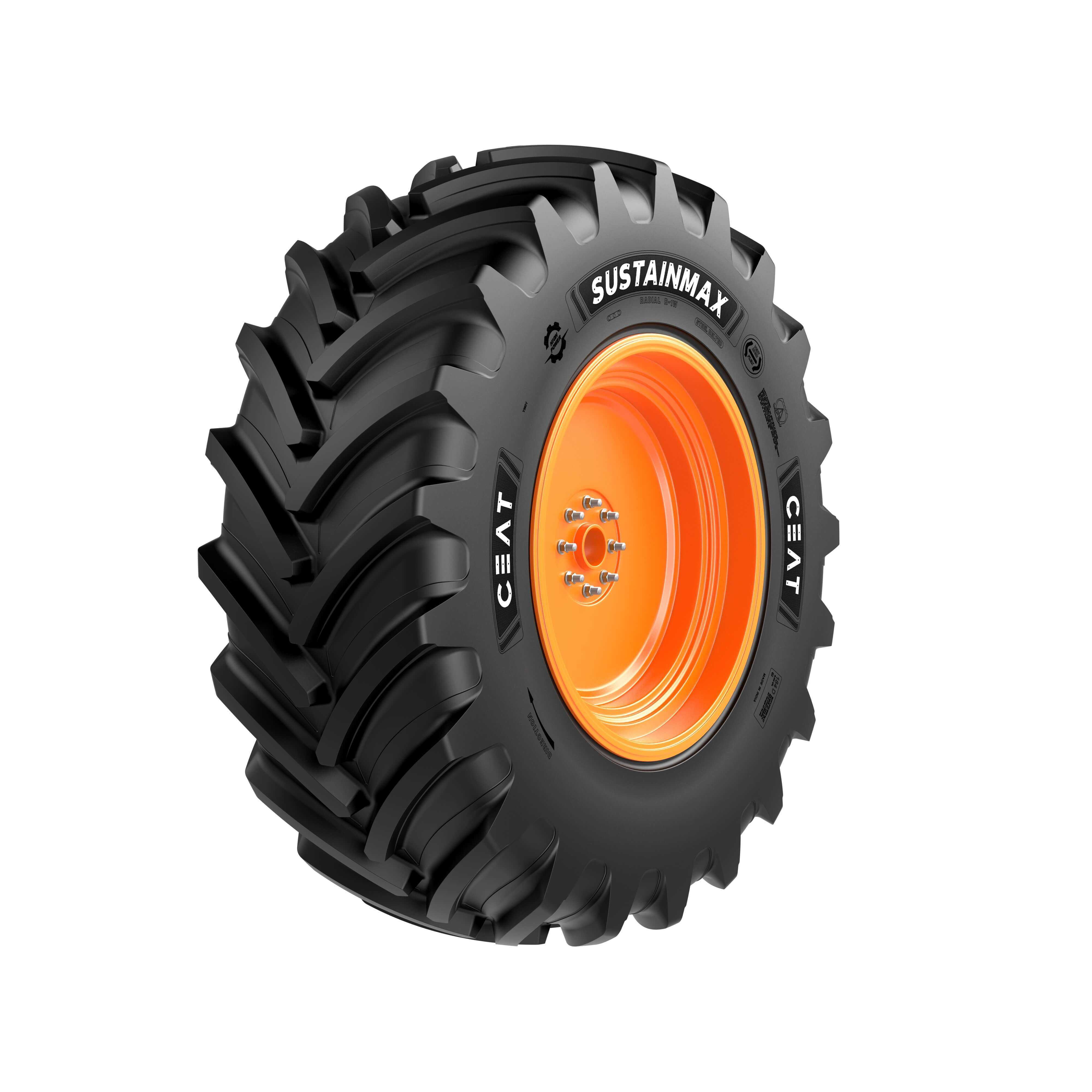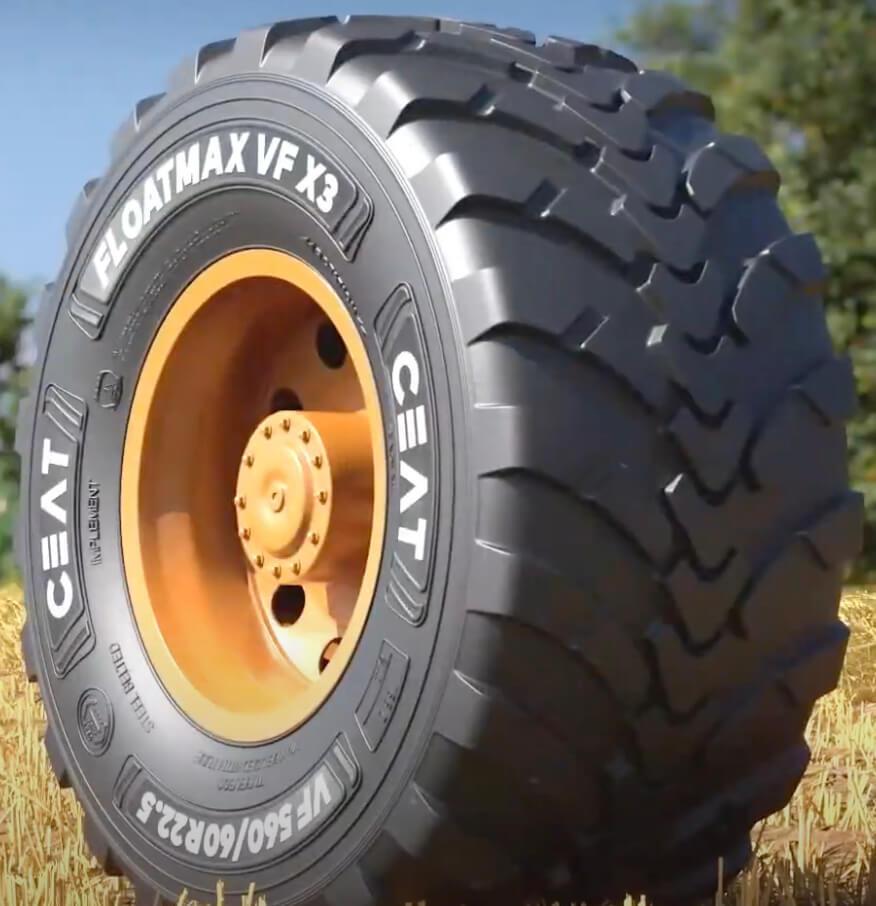
ceat-speciality:blogs-tags/all,ceat-speciality:blogs-tags/products
6 Reasons Why Logging is Tough on Tires6 Reasons Why Logging is Tough on Tires
Logging operations in forests can be particularly tough on heavy equipment tires for several reasons:
Rough Terrain: Forests are filled with uneven, rocky, and muddy terrain, which can be challenging for tires. Logging equipment must navigate through obstacles like tree stumps, large rocks, and fallen branches, which increases the wear and tear on tires.
Soft Ground: In many forests, especially in wet conditions, the ground can be soft or even swampy. This can lead to the tires sinking or getting bogged down, causing extra strain on the tires and making them more prone to damage.
The CEAT FOREST XL for forestry forwarders and harvesters can be a real ally in these conditions. This highly advanced radial features wide, robust lugs for maximum traction on soggy ground. A specially designed tread and sidewall compound shields against cuts and tears in harsh forestry environments. A uniquely designed bead area prevents rim slippage. It is currently available in the 710/45-26.5 LS2 24PR size.
Heavy Loads: Logging machinery often carries very heavy loads, such as logs, which puts significant stress on the tires. When equipment must haul large logs over uneven terrain, the tires face constant pressure, which can lead to faster wear and even punctures.
Sharp Debris: Forest floors can be littered with sharp objects like sticks, rocks, and tree roots, all of which can puncture or damage tires, especially if the equipment is moving quickly or the terrain is particularly rough.
Once again, this is where CEAT forestry tires can really help. CEAT Specialty’s forestry tire range includes the new CEAT LOGGER XL (LS2) for log skidders. It excels in harsh forestry environments with a reinforced sidewall and shoulder protectors to guard against impacts and cuts. A multi-layer nylon carcass with wide steel breakers provides excellent puncture resistance. Sizes currently available are: 23.1-26 LS2 16PR, 28L-26 LS2 20PR, and 30.5L- 32 LS2 26PR.
Frequent Turns and Maneuvering: Logging operations require a lot of turning, reversing, and maneuvering in tight spaces, which puts additional stress on the tires. This constant turning can cause uneven tire wear, especially on rough or rocky surfaces.
Limited Visibility: Operators may have limited visibility in dense forests, making it harder to avoid obstacles that could damage tires, such as hidden rocks or deep ruts in the ground.
Equipment downtime in the forest due to damaged tires or getting stuck in the mud, as well as premature tire wear, can have a serious negative impact on the profitability of logging operations. CEAT forestry tires contribute to profitability by avoiding punctures and getting bogged down in the mud, as well as delivering outstanding tread wear. When you consider their favorable acquisition price, CEAT tires are a no brainer for logging operations.
Read the full blog
ceat-speciality:blogs-tags/all,ceat-speciality:blogs-tags/products
CEAT Ag Tires are Reshaping the Way Farm Equipment PerformsCEAT Ag Tires are Reshaping the Way Farm Equipment Performs
The advancements in Ag tire technology, especially with companies like CEAT Specialty, have truly reshaped the way farm equipment performs and contributes to overall efficiency on farms.
The combination of improved tread patterns and enhanced rubber compounds has been key to addressing the challenges of modern farming. For example, the specialized tread designs of CEAT Ag tires help provide superior grip, whether in muddy or dry conditions, while minimizing the risk of damaging soil structure. This is especially crucial when it comes to reducing soil compaction, which can affect crop yields and soil health.
The durability and resistance to punctures of CEAT tires also save farmers a significant amount of time and money by reducing the frequency of tire maintenance and replacements. And when you think about how tractors and implements are constantly exposed to tough terrain, these innovations are indispensable for ensuring continuous, efficient operation.
By the way, CEAT tires are among the best in guarding against stubble damage, but sometimes a sharp cornstalk or even a deer antler with cause a puncture. No worries, CEAT Specialty has you covered with a 3-year field hazard warranty, which goes with the CEAT 7-year manufacturer’s warranty.
CEAT FARMAX tractor tires, featuring a R1-W tread depth for longer tire lifespan, are the epitome of today’s high-tech farm tires. By providing deeper treads, these tires offer improved traction and durability, crucial for traversing diverse terrains and weather conditions commonly encountered in farming.
Additionally, the lower shoulder angle of the FARMAX radial is a deliberate design choice aimed at maximizing traction. This design feature ensures that the tires maintain optimal contact with the ground, even in challenging conditions such as mud or loose soil, thereby enhancing overall efficiency during field operations.
The rounded shoulders of FARMAX tractor tires serve a dual purpose. Not only do they minimize soil and crop damage by evenly distributing the weight of the tractor, but they also contribute to improved maneuverability, allowing farmers to navigate through fields with greater ease and precision. The incorporation of wider treads and larger inner volumes in these tires also plays a pivotal role in reducing soil compaction.
Roadability is more critical than ever before, as farmers often need to transport their equipment for many miles on paved roads to different locations, requiring tires that offer reliable performance both on and off the road. CEAT FARMAX tractor tires represent a remarkable advancement in roadability, providing a smooth and steady ride on hard surfaces.
Today’s Ag tires are certainly not your grandfather’s tires, and CEAT Specialty is leading the way in technology and performance.
Read the full blog
ceat-speciality:blogs-tags/all,ceat-speciality:blogs-tags/products
CEAT Sustainmax Ag Tires are a Win for the Environment And Farm ProductivityCEAT Sustainmax Ag Tires are a Win for the Environment And Farm Productivity
Sustainability has emerged as a paramount concern with the heightened awareness of global warming and finite natural resources.
The agricultural sector is no exception. One essential aspect of sustainable agriculture that often goes overlooked is using eco-friendly and efficient Ag tires. The agricultural sector relies heavily on various types of machinery, and tractors are the workhorses of modern farming. These machines need robust and reliable tires that can withstand the rigors of farm work while also contributing to sustainable farming practices.
Reduced Soil Compaction:
It's not just about environmental responsibility. Reduced soil compaction is one of the many benefits of sustainable Ag tires which distribute the weight of heavy machinery more evenly. Soil compaction restricts root growth and water infiltration, decreasing crop yields.
Enhanced Traction:
Farming often involves challenging terrains, including wet fields and muddy tracks. Sustainable Ag tires like the CEAT Sustainmax offer superior traction, allowing farmers to navigate these conditions more effectively. This increases productivity and reduces the risk of soil erosion caused by wheel slippage.
Longer Tire Life:
CEAT Sustainmax tires, constructed with 80 percent sustainable materials, feature an innovative tread pattern and special cut and chip compound to provide resistance to wear and tear.
Lower Fuel Consumption:
Sustainable farm tires like Sustainmax reduce rolling resistance. Lower rolling resistance means that tractors and other farm vehicles require less energy to move. This translates to lower fuel consumption and reduced greenhouse gas emissions. Farmers can operate their machinery more efficiently while contributing to a greener environment.
Sustainable Ag tires like the Sustainmax are a win-win for both the environment and agricultural productivity.
Read the full blog
ceat-speciality:blogs-tags/all,ceat-speciality:blogs-tags/products
Flotation Tires Enhance Farm ProductivityFlotation Tires Enhance Farm Productivity
Flotation tires, like the new CEAT FLOATMAX VF X3 for Ag trailers, are indeed a game-changer in agriculture. These tires are specifically engineered to address the challenges farmers face when working on soggy or soft fields, offering multiple benefits that improve efficiency and sustainability.
Here's a closer look at the advantages of FLOATMAX VF X3 tires:
Reduced Soil Compaction:
One of the primary benefits is reduced soil compaction. With the larger footprint provided by the FLOATMAX VF X3, weight is spread over a wider area, which prevents the soil from being compressed under heavy machinery. This is crucial for maintaining soil health, promoting better root growth, and reducing long-term soil degradation.
Improved Traction:
The unique tread design of the FLOATMAX VF X3, especially the big center block at the tread center, ensures superior traction. This translates to better grip on wet or uneven terrain, reducing the risk of machinery getting stuck or slipping, which is particularly important for maintaining productivity during rainy seasons or in wet fields.
Increased Fuel Efficiency:
Due to their ability to reduce soil compaction and improve traction, flotation tires can contribute to lower fuel consumption. When the tires provide better efficiency in terms of handling and movement, machinery doesn’t need to work as hard, which ultimately saves on fuel costs—a critical consideration for farmers operating large fleets of equipment.
Lower Inflation Pressure:
The VF design allows for 40% lower inflation pressure compared to standard radial tires. This lower pressure is beneficial because it minimizes stress on the soil while maintaining tire durability and performance. It helps farmers achieve higher crop yields and efficiency while also saving on maintenance costs in the long run.
Protection Against Aquaplaning:
The directional tread pattern of the FLOATMAX VF X3 not only provides better traction but also offers high protection against aquaplaning. This means that even in wet conditions, the tires perform reliably, ensuring stable and safe movement over the fields.
Summary
The FLOATMAX VF X3 offers a host of advantages that directly contribute to soil health, fuel efficiency, and improved farm productivity. Good flotation tires like the FLOATMAX VF X3 are essential tools for modern farming, especially as machinery continues to get heavier.
Read the full blog
ceat-speciality:blogs-tags/all,ceat-speciality:blogs-tags/products
Flotation Tires Help Reduce Soil CompactionFlotation Tires Help Reduce Soil Compaction
As Ag machinery gets heavier and heavier, its impact on soil compaction grows more and more. That’s why CEAT Specialty is investing heavily in R&D to develop tires that minimize soil compaction, including a comprehensive line of flotation tires.
The newest flotation tire in the CEAT line-up provides the additional benefit of VF technology. The CEAT FLOATMAX VF X3 tire can operate at 40% lower inflation pressure than standard Ag radials for improved crop product efficiency, lower fuel consumption and reduced soil compaction. Conversely, the FLOATMAX VF X3 can carry 40% more weight at the same air pressure as standard radials. Other attributes include a directional tread pattern for excellent handling and a big center block at the tread center for more traction.
Soil compaction is a major challenge faced by farmers worldwide. It occurs when the weight of heavy machinery compresses the soil, reducing its pore spaces, which leads to decreased water infiltration, root development, and nutrient uptake. This results in stunted crop growth and low yield potential. One of the ways to reduce soil compaction is by fitting farm equipment with flotation tires.
Flotation tires distribute the weight of heavy machinery over a more extensive surface area, reducing its impact on the soil. These tires are designed to “float” on top of the soil rather than sinking into it, reducing the damage caused by heavy machinery. As a result, soil compaction is reduced, and the yield potential of crops is increased.
Moreover, flotation tires like the FLOATMAX VF X3 also help in increasing the overall efficiency of farm operations. They ensure that farm machinery can move easily through soft soil conditions while maintaining traction, reducing fuel consumption and wear and tear on the machinery. In turn, this reduces the operational costs for farmers while increasing their productivity.
In addition to their durability and efficiency capabilities, flotation tires are also versatile and can be used with a wide range of farm equipment, including tractors, combines, and other heavy machinery. They are available in various sizes and designs at CEAT Specialty, making it easy to choose the right tire based on your specific needs.
Read the full blog
ceat-speciality:blogs-tags/all,ceat-speciality:blogs-tags/products
LAWNMAX Radial Delivers Comfortable Ride and Long WearLAWNMAX Radial Delivers Comfortable Ride and Long Wear
Meet the LAWNMAX, one of the newest members of the CEAT tire line-up for North America, designed for garden and compact tractors.
With its deeper tread depth, the LAWNMAX offers superior traction and extended tread life compared to traditional R-3 tires. The rounded shoulder design helps reduce soil compaction, preserving soil health. An innovative tread pattern ensures effective self-cleaning, keeping the tires free from debris. This combination makes LAWNMAX an excellent choice for anyone looking to optimize their tractor’s performance in various terrain conditions.
The LAWNMAX, with its radial construction, is designed to be easy on the turf. Its block pattern provides a larger footprint and lower ground pressure. A directional tread pattern delivers a comfortable ride and lower rate of wear.
The LAWNMAX is the product of a world-class manufacturing process at CEAT. To produce high-quality tires for North America and other major markets throughout the world, CEAT focuses on continuous improvement and innovation using Digital and Industry 4.0 technologies across its plants to enhance its value chain.
“Smart” factories, like the CEAT plant in Ambernath, that produces high-quality Ag, OTR and forestry radials for North America, have an agile work culture and are equipped with virtual reality-based training stations to ensure faster and better operator training.
The company upgraded its technology with Edge and Cloud architecture and developed a Digital Analytics Center of Excellence with over 25 experts to solve manufacturing issues digitally.
This company-wide dedication to producing high quality tires is why CEAT is receiving rave reviews across the US and Canada.
Read the full blog
ceat-speciality:blogs-tags/all,ceat-speciality:blogs-tags/products
Ceat Specialty Introducing Forestry Tire RangeCeat Specialty Introducing Forestry Tire Range
CEAT Specialty, which has been serving the North American market with Ag and OTR tires for seven years, is adding a forestry tire range to its North American portfolio, including tires for log skidders, forwarder harvesters and other forestry equipment.
“The introduction of our forestry tire range signifies a pivotal achievement in our ongoing journey of expansion,” said CEAT Specialty Chief Executive Amit Tolani. “Building on our achievements in agriculture, industry, mining and port applications, where we have consistently delivered top-quality products, we are thrilled to add a forestry tire collection to our portfolio.”
CEAT Specialty’s forestry tire range includes the new CEAT LOGGER XL (LS2) for log skidders. It excels in harsh forestry environments with a reinforced sidewall and shoulder protectors to guard against impacts and cuts. A multi-layer nylon carcass with wide steel breakers provides excellent puncture resistance. Sizes currently available are: 23.1-26 LS2 16PR, 28L-26 LS2 20PR, and 30.5L-32 LS2 26PR.
In addition, the CEAT FOREST XL for forestry forwarders and harvesters features wide, robust lugs for maximum traction. A specially designed tread and sidewall compound shields against cuts and tears in harsh forestry environments. A uniquely designed bead area prevents rim slippage. It is currently available in the 710/45-26.5 LS2 24PR size.
Tolani added, “The North American market is extremely important to CEAT Specialty. Expanding our portfolio to include forestry tires is a great example of our commitment to working closely with our distributor and dealer partners to address market needs.”
About CEAT
CEAT was established in 1924 in Turin, Italy. Today, it is one of India’s leading tire manufacturers, and CEAT tires are sold in more than 115 countries worldwide.
The brand, which celebrated its 100-year anniversary this year, came to India in 1958. Later it became part of the RPG Group. RPG is among the top business houses in India, with a group turnover of more than $4 billion.
In the specialty segment, CEAT manufactures farm, mining, and earthmover, industrial, forestry and construction equipment tires, as well as special application off road tires. The CEAT Specialty Tires headquarters in North America is in Jefferson City, MO.
Read the full blog
ceat-speciality:blogs-tags/all,ceat-speciality:blogs-tags/products
YIELDMAX Ready to Roll This Harvest SeasonYIELDMAX Ready to Roll This Harvest Season
Harvesting season is upon us, and the CEAT YIELDMAX will again be proving its worth in fields across North America.
The YIELDMAX is a new generation agricultural radial tire meant for the combine harvester market. Its main purpose is to support massive machinery and provide a higher load capacity .
The YIELDMAX is engineered and designed to ensure minimum impact on soil, which has become an increasingly large concern for North American farmers. It features a lower lug angle around the shoulders that ensures higher traction. Sharp shoulders enable excellent grip. A higher lug angle around the center lug provides better side stability.
This high-tech Ag radial has a tough casing and rigid belt that provides all the advantages of radial construction while supporting heavy equipment and loads. It is suitable for all types of harvesting applications, like combine harvester, forage harvester and sugarcane harvester.
Whether its YIELDMAX radials for harvesting machines, FARMAX tractor tire radials or other tread patterns in the CEAT Specialty line-up, the company is fulfilling its mission to offer high quality tires at a better value to North America’s farmers and ranchers.
CEAT is, in fact, obsessed with producing the highest quality tires. The company was awarded the Deming Grand Prize, considered one of the highest achievements in TQM (Total Quality Management) worldwide. In doing so, CEAT became the first tire brand and one of only 33 companies globally to receive the prestigious award.
The Deming Prize, instituted out of Japan, is a recognition of business excellence. It is awarded to organizations that have achieved the Deming Prize and have continued to sustain and elevate their Total Quality Management (TQM) practices for more than three years. CEAT has been on the TQM journey for over fifteen years and was the first tire company outside Japan to win the prestigious Deming Prize in 2017.
Read the full blog
ceat-speciality:blogs-tags/all,ceat-speciality:blogs-tags/products
New CEAT MULTILOADMAX is an “All-in-One” TireNew CEAT MULTILOADMAX is an “All-in-One” Tire
CEAT Specialty team members constantly get advice from the company’s tire dealers and OEM partners on new tires and sizes needed for the ever-evolving North American market. Then, the company acts with warp speed to bring new products and sizes to the market. In fact, the company introduced 100 new sizes to the market last year alone.
The new CEAT MULTILOADMAX is one such product that fills an important need. Its versatile hybrid R-4 block design is engineered for durability and performance on any terrain. Ideal for mowing, utility work, snow plowing and trailer hauling, this all-in-one tire is perfect for a variety of construction and agricultural operations.
Featuring a big center block for stability on roads and unique angular grooves for excellent self-cleaning, the MULTILOADMAX ensures consistent performance in varied conditions. Its steel-belted carcass offers uniform load distribution and excellent puncture resistance. With its uniquely designed bead area, the MULTILOADMAX provides superior traction on both on-road and off-road surfaces.
The MULTILOADMAX is currently available in the 600/70 R30 and 710/70 R42 sizes.
Read the full blog














